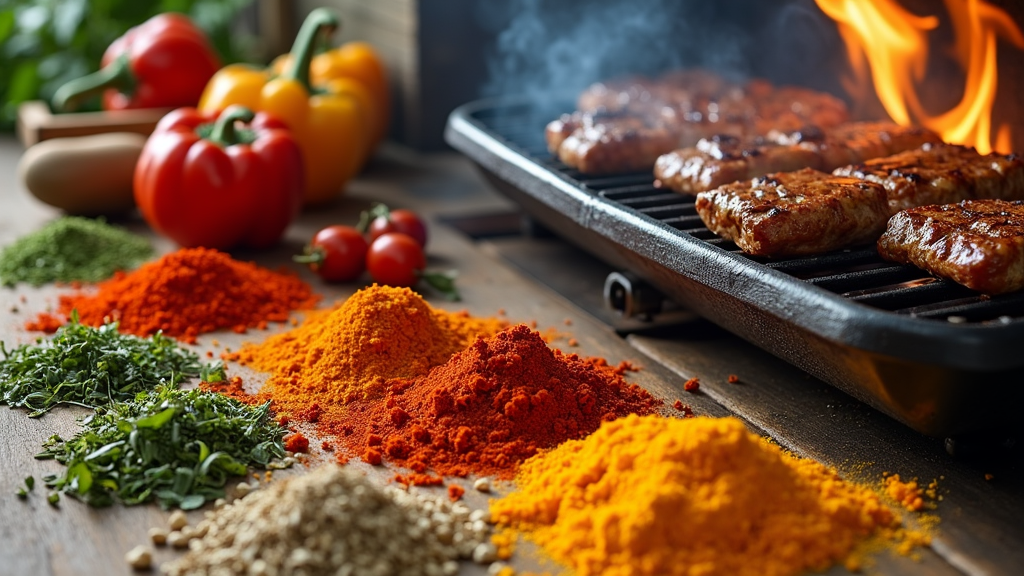Grilling is one of those timeless cooking methods that brings people together for a shared meal and memorable moments. Whether you’re a seasoned griller or just starting out, the debate between using rubs and marinades is always a heated topic. In this article, I check out the ins and outs of flavoring your meat, helping you decide which approach suits your style and taste best.

Essential Elements for Flavorful Grilling
Grilling brings out unique flavors in food that are hard to replicate in other cooking styles. The beauty of grilling lies in its simplicity. It uses heat to caramelize sugars and infuse spices. Seasoning plays a huge role in that process. When it comes to achieving a stellar flavor, rubs and marinades are two popular methods that each have their own benefits.
Rubs are blends of dry spices that cling to the meat, creating a crust that locks in juices and adds a burst of flavor with every bite. Marinades, on the other hand, usually contain a mix of acidic liquids, oils, and spices that work to tenderize and flavor the meat from the inside out. Both methods have a rich history in culinary traditions from around the world and offer unique advantages depending on the type of meat and the desired flavor profile.
Understanding the fundamentals of how these flavoring techniques work will help you make more informed choices when preparing your next barbecue meal. It’s all about experimenting with flavors and learning from each grilling session.
Getting Started with Rubs and Marinades
If you’re new to the world of grilling, it might feel overwhelming with all the different techniques available. Learning how to use rubs and marinades properly is a great start. Both processes are rooted in the idea of giving a boost to the natural taste of meat, though they approach it in different ways.
A good dry rub has a mix of salt, sugar, herbs, and spices. Its benefits include forming a flavorful crust when the meat is grilled. Some common ingredients in a rub might be paprika, garlic powder, onion powder, and a touch of chili for heat. The mix can be customized to match your taste preference. When applying a rub, you want to cover the meat thoroughly, making sure the spices get into any crevices.
Marinades are liquid mixtures that generally include some acidic component, such as vinegar, citrus juice, or wine, combined with oils, herbs, and sometimes sweeteners. The acid in a marinade helps break down the muscle fibers, making the meat more tender, while the oil carries fat-soluble flavors into the meat. Keep in mind that not all meats benefit equally from marination; tougher cuts can handle longer marinating times, while delicate cuts need less time to avoid becoming mushy.
When starting out, consider trying both methods to understand how they affect your meat. Experiment with simple recipes and adjust the seasoning to match your grill’s personality and your dietary preferences.
Considerations Before Choosing the Right Flavor Booster
Before settling into a routine, it’s important to consider your flavor goals and the practicalities of your grilling setup. Below are some factors you should weigh when deciding between rubs and marinades:
- Type of Meat: Red meats like beef often benefit from a hearty rub, while chicken and pork may fare well in a marinade that tenderizes the meat.
- Cooking Time: Meat that requires long, slow cooking might gain more intense flavor from a well-formed rub crust. Quick grilling might suit the fast-acting nature of a marinade.
- Texture Preferences: If you enjoy a crispy exterior, rubs are a great choice. They create a dry, caramelized surface that can add a delightful crunch. Conversely, marinades often leave the exterior a bit softer, focusing on overall juiciness.
- Preparation Time: Marinating can require hours or even overnight soaking, while rubs can be applied shortly before grilling.
- Ingredient Availability: Think about what spices and liquids you have on hand. Often, a simple pantry spice mix can be just as effective as a well-crafted marinade.
Cooking Duration
When planning your grill session, it’s important to match your seasoning method with your cooking time. For slow-cooked cuts that benefit from longer exposure to heat, a rub can form a protective barrier that holds in moisture. On the other hand, quick-cooking cuts may only need a light marinade to maintain moisture and impart flavor without overwhelming the natural taste of the meat.
Type of Meat and Marinade Times
The type of meat you’re working with can heavily influence which method is best. Tougher cuts that require marination should be immersed longer to break down fibers. More delicate meats, such as fish or thin cuts of chicken, need shorter exposure to avoid a mushy texture. Experimenting with marination times for different meats is a fun way to learn what each variety needs.
Storage, Safety, and Preparation
Safety is as important as flavor when preparing your seasonings. Always marinate in a sealed container and store your marinating meat in the refrigerator to avoid any bacterial growth. Rubs, however, tend to be more forgiving since they don’t involve liquids, but cleanliness and correct storage remain key to good results.
Advanced Tips and Tricks for Flavor Infusion
Once you’ve mastered the basics, exploring some advanced techniques can help take your grilling game up a notch. Here are a few practical tips that might just transform your next barbecue:
Layer Flavors: Consider using both a marinade and a rub in tandem. Start by marinating your meat for a few hours and then apply a dry rub right before grilling. This method allows you to tenderize the meat with a marinade and then create a spicy crust with the rub. It gives you the best of both worlds.
Play with Ingredients: Don’t be afraid to experiment with spices. Try introducing less typical ingredients like coffee grounds, cocoa powder, or even a hint of cinnamon to add a complex layer of taste. The goal is to build flavors gradually without masking the natural taste of the meat.
Control the Heat: Grilling isn’t just about seasoning; it’s also about how you manage the heat. For rubs, keeping an eye on the grill temperature ensures that the spice mixture doesn’t burn before the meat is cooked through. When using marinades, be cautious of sugars that can quickly char if exposed to excessive heat.
Advanced grillers also pay attention to resting times, allowing the meat to settle and reabsorb its juices before serving. Practices like these can make all the difference between a good meal and one that’s truly memorable.
The Basics: What Should Grillers Focus On?
For anyone starting out in the world of grilling, the key is to focus on a few essential points. Remember that quality ingredients and the right cooking method can help you get the most out of your flavoring techniques.
Start with a few basic recipes and adjust based on your taste. Understanding whether the meat needs tenderizing or a flavor boost from the outside plays a big part in deciding between a rub or a marinade. Both methods have their place in the griller’s toolkit, and many chefs eventually blend techniques to suit specific recipes.
It’s also important to pay attention to timing. Over-marinating can lead to a mushy texture, while under-seasoning might leave your meat tasting bland. Find a balance through trial and error. Recording your experiments can be a great way to refine your process over time.
- Keep it Simple: Start with basic ingredients. Salt, pepper, garlic, and olive oil are a strong foundation for either method.
- Invest in a Good Grill: A reliable grill that maintains consistent heat makes all the difference in ensuring even cooking and optimal flavor development.
- Practice Patience: Good flavor takes time to develop. Whether marinating or applying a rub, allow the process to work its magic at its own pace.
Frequently Asked Questions
Many grill enthusiasts have common queries when it comes to flavoring their meat. Here are a few questions that might help clear up some doubts:
Question: Should I use a rub or a marinade for all types of meat?
Answer: It depends on the meat. Tougher cuts like beef brisket can handle a dry rub for a fuller flavor during long cooking times, while leaner meats like chicken might benefit from a marinade that helps keep them moist.
Question: How long should I marinate my meat before grilling?
Answer: Marinating times vary by meat type. For chicken or fish, 30 minutes to 2 hours is often enough. Beef and tougher cuts may benefit from marinating for 4 to 12 hours, but be careful not to overdo it!
Question: Can I use the same rub or marinade for different meats?
Answer: While some blends work well across various meats, certain recipes are tailored to enhance specific flavors. Experimenting with small batches is a good idea until you find your signature mix.
Question: What are some safe practices when using marinades?
Answer: Always marinate in the refrigerator and never reuse marinade that has come into contact with raw meat unless it has been boiled first. This avoids any risk of cross-contamination.
Extra Tips for a Next-Level Grilling Experience
For grill enthusiasts looking to take their cooking game up a notch, it is very important to experiment with different techniques that can make your barbecue truly memorable. One idea is to try out various types of wood chips for smoking. Wood flavors can vary widely from hickory to applewood, each lending an eye-catching aroma to your grilled treats. Experiment with these options to see which one works best for you, and consider mixing different woods to craft a unique flavor profile that sets your meals apart.
Another smart approach is to preheat your grill thoroughly and maintain an even temperature throughout the cooking process. Using a reliable thermometer to monitor the heat can really help prevent uneven cooking. This strategy not only avoids the risk of burning the outside of the meat while leaving the inside undercooked, but it also ensures that every bite is as juicy and flavorful as possible. Home chefs often find that a well-prepared grill produces consistently better results. Give a boost to your routine by testing various preheat methods until you find the one that works best for your setup.
Finally, experiment with unconventional flavor boosters. Consider adding ingredients like citrus zest, fresh herbs, or a dash of mustard to your rubs or marinades to introduce an unexpected twist. Sometimes simply switching the order in which you apply your seasonings will yield surprising and delicious results. Keeping notes of what you try can help refine your method over time. Remember that grilling is not merely a way to cook—it’s an adventure that invites you to get creative, test new ideas, and ultimately craft meals that truly reflect your personal taste.
Conclusion
Flavor is at the heart of mastery in grilling, and both rubs and marinades offer unique ways to transform your meat. Whether you enjoy the crunchy, spiced exterior provided by a good dry rub or the tender, juiced boost from a marinade, the key is to experiment and find a balance that suits your taste. Understanding the ingredients, timing, and cooking methods for each technique can help you bring out the best in every cut of meat.
Grilling is as much about the adventure as it is the final dish. Jump into your next barbecue with curiosity and a readiness to try new flavor combinations. With practice and attention to detail, every grilling session can turn into a delightful exploration of taste and texture. Enjoy the process. Let your creativity turn simple meals into a feast of flavors.
